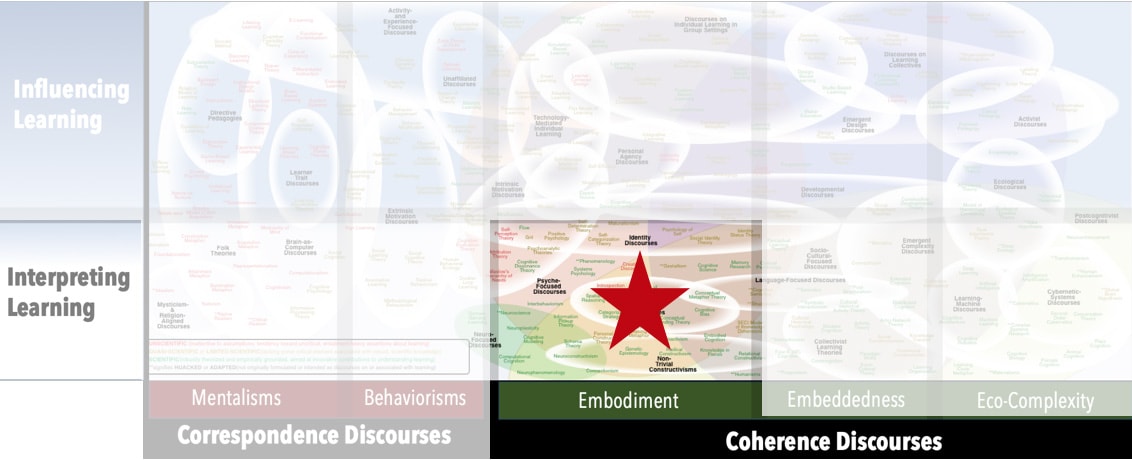Focus
Making meaning through causal explanationsPrincipal Metaphors
- Knowledge is … repertoire of behaviors and justifications
- Knowing is … behaving
- Learner is … an actor (individual)
- Learning is … making meaning (of experiences through attributions of cause)
- Teaching is … channeling attentions to habits of attribution/blame
Originated
1920sSynopsis
Attribution Theory is developed around the assumption that individuals are motivated to develop causal explanations of behaviors and events. Such explanations posit either:- Internal Attributions (Intrapersonal Attributions) – explanations of behaviors and/or events that are offered in terms of personal qualities, such as ability, mood, or effort
- External Attributions (Interpersonal Attributions) – explanations of behaviors and/or events that are offered in terms of situational factors, such as the task, social conventions, or accident
- Attribution Retraining (Bernard Weiner, 1970s) – therapy aimed at influencing a learner’s attributions – typically away from traits beyond one’s control (e.g., “I failed because I’m tall.”) and toward qualities or conditions that one can influence (e.g., “I failed because I didn’t duck.”)
- Blame Attribution Theory (Gisli Gudjonsson, 1980s) – as the name suggests, a perspective of the cognitive processes associated with how and where people assign blame for negative events
- Correspondent Inference Theory (Edward Jones, Keith Davis, 1960s) – a proposal on how one might form inferences about others’ personalities based on their actions
- Culpable Control (Mark Alicke, 2000s) – a model linking of blame-taking that links one’s intentions in an action to the eventual consequences of that action, suggesting that more responsibility is assumed when intentions and consequences are more aligned
- Fundamental Attribution Error (Attribution Bias; Attribution Effect; Correspondence Bias) (Lee Ross, 1960s) – when assigning responsibility for a person’s behaviors, the tendency to over-emphasize personal qualities (e.g., disposition) to and under-emphasize situational factors
- Lay Psychology (Naïve Analysis of Action; Naïve Psychology) (Fritz Heider, 1950s) – the everyday assumptions and reasoning strategies used to conclude whether a specific actor cause a specific action
- Naïve Personality Theories (Implicit Personality Theories) – everyday, uncritical, and usually implicit assumptions about clusters of personality traits
Commentary
An implicit assumption in Attribution Theory, evident in its focus on causal explanations, is that humans are rational and systematic thinkers. Current evidence suggests that this assumption is incorrect. As well, explications of Attribution Theory tend to come across as attributing internal attributions to individual. Although that tendency is consistent with the theory, it ignores social and cultural condition that cannot be tidily classified as either personal or situational factors.Authors and/or Prominent Influences
Fritz Heider; Bernard WeinerStatus as a Theory of Learning
Although Attribution Theory addresses one mechanism of learning (i.e., causal explanations as a source and site of meaning-making), it falls well short of offering a nuanced and comprehensive account of the complex dynamics of learning.Status as a Theory of Teaching
Attribution Theory is not a theory of teaching, but some of its recommended strategies to support and empower learners have become quite popular in schools. For example, Attribution Theory has been applied to address issues associated with self-motivation, learned helplessness, self-awareness, personal empowerment, empathy, and a range of soft skills. Recommended strategies revolve around supporting individuals, first by helping them hear how they explain their own and others’ actions, and then by challenging those interpretations.Status as a Scientific Theory
Core elements of the Attribution Theory are contradicted by scientific theories of learning (esp. Cognitive Science), and its evidence base appears to be limited.Subdiscourses:
- Attribution Retraining
- Blame Attribution Theory
- Correspondent Inference Theory
- External Attributions (Interpersonal Attributions)
- Fundamental Attribution Error (Attribution Bias; Attribution Effect; Correspondence Bias)
- Culpable Control
- Internal Attributions (Intrapersonal Attributions)
- Lay Psychology (Naïve Analysis of Action; Naïve Psychology)
- Naïve Personality Theories (Implicit Personality Theories)
Map Location

Please cite this article as:
Davis, B., & Francis, K. (2025). “Attribution Theory” in Discourses on Learning in Education. https://learningdiscourses.com.
⇦ Back to Map
⇦ Back to List
